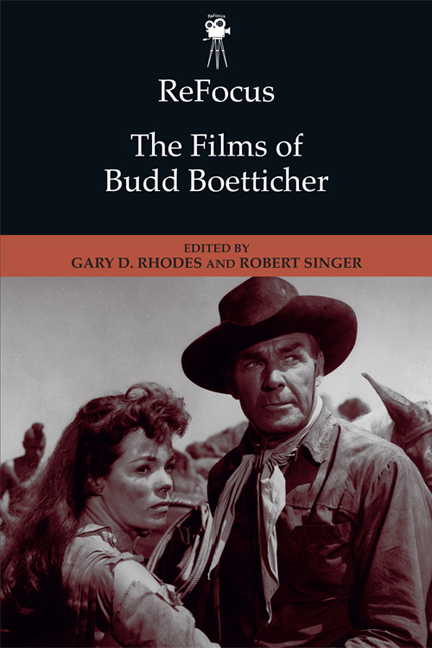Book contents
- Frontmatter
- Contents
- Notes on Contributors
- Dedication
- Introduction
- Part 1 The Non-Westerns
- Part 2 The Westerns
- Part 2 Introduction
- 7 The Ranown Cycle: Budd Boetticher's “New Look” Western Programmers in 1950s Hollywood
- 8 Framings, Motifs, and Floating Poker Games in Seven Men from Now (1956)
- 9 The Ranown Style: Mapping Textual Echoes
- 10 You Were Married, But You Never Had a Wife: The Use of Space in the Westerns of Budd Boetticher
- 11 Ideology and Boetticher's Westerns from the Late 1950s
- 12 Outlaws Without a Cause: Generational Conflict in Budd Boetticher's Ranown Cycle
- 13 The Box in the Desert: Budd Boetticher, Breaking Bad, and the Twenty-first-century Western
- Index
12 - Outlaws Without a Cause: Generational Conflict in Budd Boetticher's Ranown Cycle
from Part 2 - The Westerns
Published online by Cambridge University Press: 22 December 2017
- Frontmatter
- Contents
- Notes on Contributors
- Dedication
- Introduction
- Part 1 The Non-Westerns
- Part 2 The Westerns
- Part 2 Introduction
- 7 The Ranown Cycle: Budd Boetticher's “New Look” Western Programmers in 1950s Hollywood
- 8 Framings, Motifs, and Floating Poker Games in Seven Men from Now (1956)
- 9 The Ranown Style: Mapping Textual Echoes
- 10 You Were Married, But You Never Had a Wife: The Use of Space in the Westerns of Budd Boetticher
- 11 Ideology and Boetticher's Westerns from the Late 1950s
- 12 Outlaws Without a Cause: Generational Conflict in Budd Boetticher's Ranown Cycle
- 13 The Box in the Desert: Budd Boetticher, Breaking Bad, and the Twenty-first-century Western
- Index
Summary
Generational issues were nothing new to the Western in the late 1950s. In fact, the post-World War II Western appeared to thrive on questions of generational difference. Howard Hawks's Red River (1948), presented the aging Thomas Dunson (John Wayne) as violent, tyrannical, and irrational, while his adopted son Matthew Garth (Montgomery Clift, one of the first Method actors to make the transition to Hollywood) demonstrated a measured and logical approach to leadership. Other major postwar Westerns frequently sided with youthful alternatives when presented with generational conflict. In John Ford's The Searchers (1956), Ethan Edwards (John Wayne) stands in for an aging and broken masculinity shot through with racism while Martin Pawley (Jeffrey Hunter)—in Edwards's mind a “half-breed”—embodies a younger and more sympathetic brand of multiracial masculinity. In many of Anthony Mann's 1950s Westerns, the conflicts are more familial, with strong Freudian overtones. Featuring brothers fighting brothers, in Winchester –73 (1950), and twisted relationships between both biological and adoptive parents and children—The Furies (1950), The Man from Laramie (1955), and Man of the West (1958)—Mann's films present a postwar world where parents such as Dock Tobin (of Man of the West) are the primary corrupting forces in the social and political landscape.
The prevalence of heroic youngsters and broken, if not monstrous, father figures in these Westerns is curious in light of common assumptions about the genre's conservatism. It is doubly interesting in a period during which the Western redoubled its efforts to appeal to an adult audience that had followed the genre as children in 1930s B pictures. These heroic Western youths also stand out in light of the growth of films in the 1950s dealing with juvenile delinquency. After the release of Laslo Benedek's The Wild One (1953), starring celebrated young stage actor Marlon Brando, fresh from a successful film adaptation of Tennessee Williams's A Streetcar Named Desire (Elia Kazan, 1951), Hollywood studios began to capitalize on larger cultural fears of generational conflict, from the biker gangs of Benedek's film to the high school gangs in Richard Brooks's Blackboard Jungle (1955) and the confused and anxious characters of Nicholas Ray's Rebel Without a Cause (1955). Featuring troubled and inexplicable teenagers, these films presented the younger generation posing dangerous threats to existing social order.
- Type
- Chapter
- Information
- ReFocus: The Films of Budd Boetticher , pp. 206 - 227Publisher: Edinburgh University PressPrint publication year: 2017



